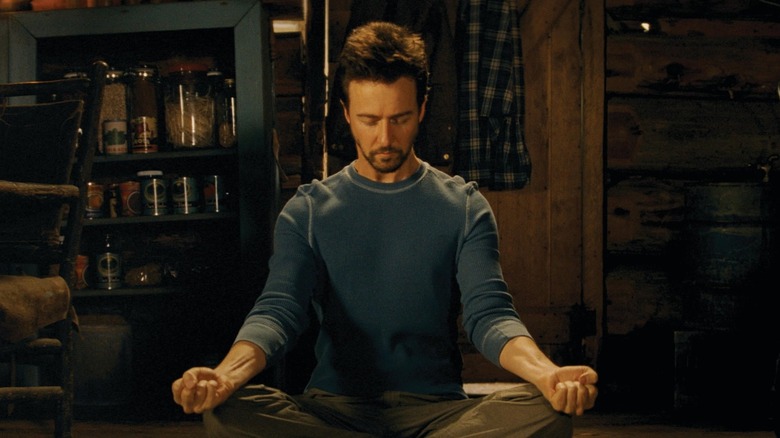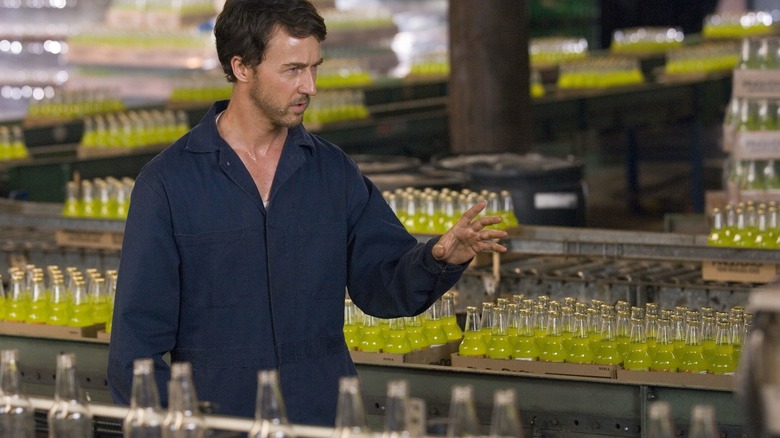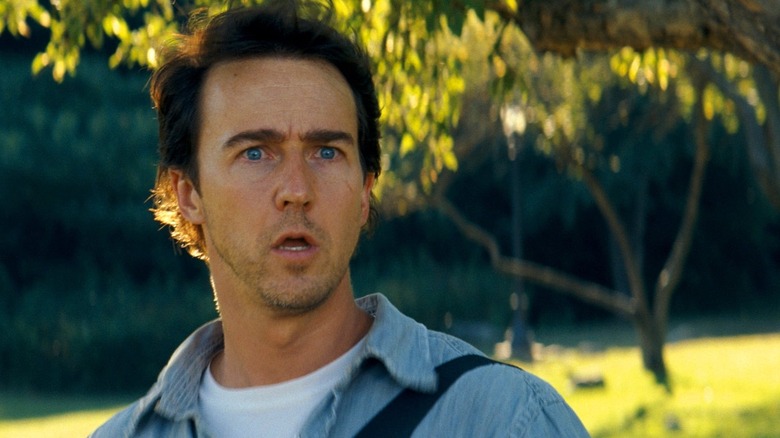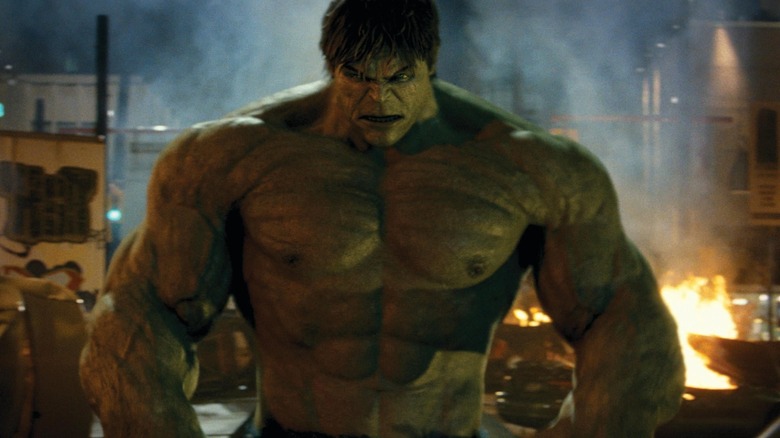Why Edward Norton Turned Down Starring In An Incredible Hulk Sequel
When Alejandro González Iñárritu's film "Birdman or (The Unexpected Virtue of Ignorance)" won the Academy Award for Best Picture in February of 2015, it appeared to be a rebuke of modern blockbuster trends. In the film, a perfectly cast Michael Keaton played an actor named Riggan Thompson who, in the late '80s and early '90s, had risen to fame playing a silly superhero character called Birdman. Ever since, Riggan had been fighting to regain his credibility as a "serious actor," leading him to star in the high-profile Broadway play which serves as the centerpiece of the film. There is a lot of dialogue in "Birdman" about how superhero movies are a form of selling out, and that the temptation to star in — by the film's estimation — empty entertainment is antithetical to art and to the craft of acting. Despite the commentary in "Birdman," superhero flicks are still the biggest business eight years later.
After the film's pointed rebuke of superhero movies, it's certainly ironic that Keaton has agreed to reprise his "Batman" role in several upcoming feature films, or that he should agree to be in colorful, high-end shlock like "Spider-Man: Homecoming" and the ultra-popular, twice-released "Morbius."
Also appearing in "Birdman" was Edward Norton, another actor who, like his character in the film, has found himself torn between a popular superhero role — in his case, in Louis Leterrier's 2008 film "The Incredible Hulk" — and the need to be seen as an actor with range and a propensity for fascinating projects. In a 2014 interview on NPR's "Fresh Air," Norton spoke to host Terry Gross about his decision to leave the Hulk behind and pursue those kinds of projects.
The popularity of the Hulk
It's worth noting that "The Incredible Hulk," released by Universal, was only retroactively incorporated into the ever-bloating MCU. It wouldn't be until the year after its release that Disney would purchase the film rights to most Marvel Comics characters and put their plan for an "Avengers" feature film — and then a subsequent, all-consuming cinematic universe — into play. Both "Hulk" and Jon Favreau's "Iron Man," from the same year, included cute Easter eggs as winking fan service, but were not yet meant to be read by audiences as ads for an upcoming project or a statement of purpose. As such, Leterrier's film didn't receive the same sort of media blitz that currently comes hand-in-glove with most MCU films in the modern age.
So when Norton was asked about any popularity that he might have garnered from "Hulk," he was diplomatic, acknowledging the film yet stating that it hasn't overshadowed the rest of his career:
"I would say I encounter ... the large preponderance of people who come up to me with some sort of a strong relationship or reaction to work I've done since, you know, the mid-'90s. It's for other things, and I think — that doesn't mean I don't find people appreciate it, or that I'm not proud of that one. I think it's a lot of fun. I really wanted to make that movie, and I grew up on it, too. And I think there's a very mythic element to the Hulk story in particular. But I never — I didn't find it constricting or limiting in the slightest."
'I wanted more diversity'
When Gross asked Norton why he didn't want to return to the role of Bruce Banner — actor Mark Ruffalo would take over the role for the 2012 film "The Avengers" – he explained calmly that he was more or less done with "that kind of movie." He did a superhero film, and pursuing commercial fame wasn't a concern of his. He would rather pursue, in his words, "diversity":
"I think that ... you know, my feeling was that I experimented and experienced what I wanted to. I really, really enjoyed it. And yet, I looked at the balance of time in life that one spends not only making those sorts of films, but then especially putting them out and obligations that rightly come with that. And there were just a lot of things that — I wanted more diversity. I sort of chose to continue on my path of having a diversity of experiences."
Was his rejection of "Hulk" sequels a conscious choice to distance himself from a role that would become bigger than him? Norton says it might have been unconscious. After all, many actors who play superheroes often become closely associated with their roles — and not just Michael Keaton. Ask George Reeves, Adam West, Christopher Reeve, Lou Ferrigno, Lynda Carter, Chris Evans, or Chris Hemsworth how often they're recognized for their acting outside of their superhero jobs.
Norton vs. Feige
Norton says he wasn't thinking directly about the Hulk role taking over. He was more concerned with his pliability as a performer, and a sequel to anything is antithetical to that:
"Maybe on some unconscious level, I didn't want to have an association with one thing that in any way would degrade my effectiveness as an actor. In characters. I think you can sort of do anything once, but if you do it too many times it can become a suit that's hard to take off, in other people's eyes. And if I had continued on with it, I wouldn't have made 'Moonrise Kingdom' or 'Grand Budapest' or 'Birdman' because those all overlapped. And those were more the priority for me. But I totally, you know ... I continue to be a fan. And I'm really, really happy I got to do it once. That particular character I think has a really proud tradition actually of really good actors playing him. And I think I'm really happy to be part of it."
It's not that Norton hates the MCU or hated playing the Hulk. Indeed, Norton was once keen on exploring the Hulk in sequels, just not in the way the studio wanted. Norton once wanted to make two additional Hulk films, more character pieces, wherein the actor would have a greater deal of creative control over where Bruce Banner would go and what the films would be like. Sadly for Norton, the studio wanted something more broadly commercial, and Norton lost interest. Norton is on record criticizing Marvel Studios president Kevin Feige for his insistence on brand loyalty, and Feige is on record about looking for an actor with a better "collaborative spirit."
The rest is now film history. "The Incredible Hulk" is retroactively a black sheep in the MCU, while the Hulk character has gone on to appear in multiple films and an upcoming TV show, all played by Ruffalo. Norton, meanwhile, last appeared in "The French Dispatch," and will soon appear in the sequel to "Knives Out."



